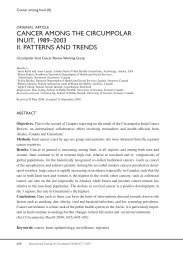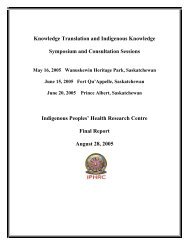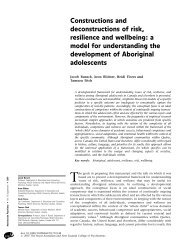EVALUATION OF THE ONTARIO COMMON ASSESSMENT ... - CCIM
EVALUATION OF THE ONTARIO COMMON ASSESSMENT ... - CCIM
EVALUATION OF THE ONTARIO COMMON ASSESSMENT ... - CCIM
You also want an ePaper? Increase the reach of your titles
YUMPU automatically turns print PDFs into web optimized ePapers that Google loves.
OCAN Evaluation for Aboriginal Mental Health Programs<br />
The providers generally welcome the concept of a standardized assessment tool. They had formulated a very<br />
concrete and strategic picture of their requirements for a standardized assessment tool and how such a tool<br />
could benefit clients and service development.<br />
Perceived Adequacy of OCAN Staff Training and Support<br />
A service coordinator took part in the “train the trainer” session provided by the CMH-CAP OCAN trainers.<br />
Local staff including two NSTC visiting mental health providers were then subsequently trained. The community<br />
level providers felt that the locally conducted training was quite good, however a refresher course was very<br />
necessary, particularly since the OCAN had not been used by many providers nor for all clients at this point.<br />
Workers believed that the client cases provided during the training sessions would benefit from an Aboriginal<br />
specific cultural component, as Aboriginal clients’ interaction related to the OCAN assessment tool vary<br />
considerably from the provided example cases. Developing Aboriginal client cases would better prepare<br />
workers to respond to the barriers and concerns perceived by many Aboriginal clients with respect to the<br />
OCAN.<br />
Current status of OCAN implementation<br />
At the time of this evaluation, staff has not been able to complete any of the staff or consumer assessments in<br />
all but two of the participating sites. None of the sites had been able to make significant progress<br />
implementing the OCAN in their service delivery model. Those sites that had completed some assessments had<br />
only managed to complete very few. The challenges related to the OCAN implementation are described in<br />
the following sections.<br />
OCAN’s fit within the service delivery on the North Shore<br />
Perceived importance of a standardized assessment tool<br />
Providers explained that there was lots of excitement, when the OCAN pilot was first discussed. The lack of a<br />
standardized assessment tool had long been perceived as a problem. In particular this lack of a standardized<br />
assessment tool has resulted in clients having to tell their story over and over. One worker explained that<br />
“clients are assessed to death” in the current system. The notion of a culturally appropriate standardized<br />
assessment tool is therefore strongly supported by staff as is the basic concept of an assessment tool with a<br />
broad range of domains designed to provide a holistic overview of each client’s individual situation.<br />
Furthermore, the prospect of collecting and accessing standardized information that can be summarized to<br />
provide current statistics on services and needs of clients is seen as a very important incentive to participate in<br />
the implementation of a standardized electronic assessment tool. Workers believed this would help in more<br />
strategic and evidence based development of mental health and supportive services. Finally, the<br />
implementation of a comprehensive assessment tool within the mental health services is also seen as<br />
contributing to building skills and capacity at the community level.<br />
Sutherland & Maar - March 2010 Page 29








